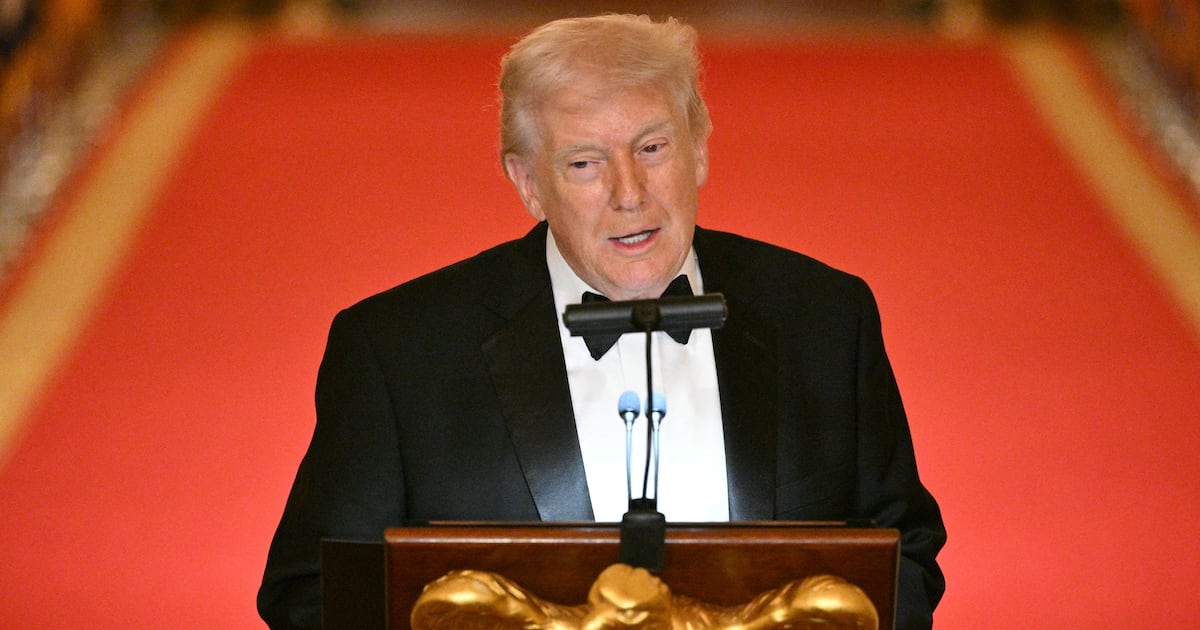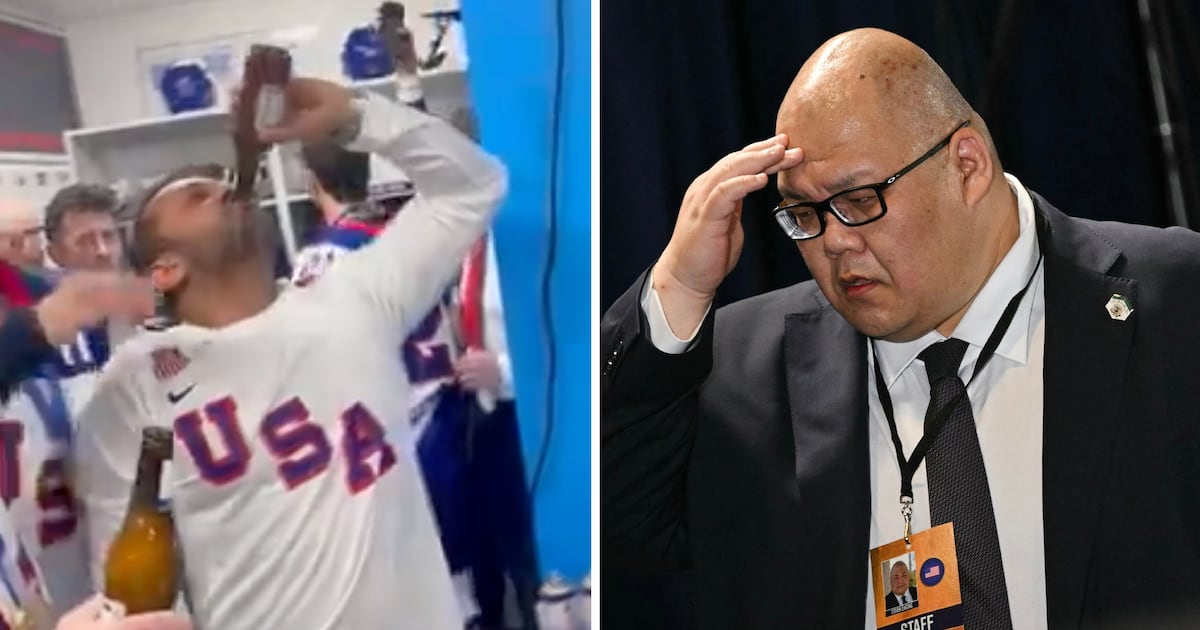With one edict, Pope Francis may have turned away mobsters from entering the gates of Heaven.
It was last summer when the pope dropped the holy hammer on Italy’s organized crime. During a visit to Calabria, a southern Italian region rife with Mafiosi, and standing before a sea of 250,000 faithful the pontiff’s Mass delivered a devastating blow: “Those who follow the path of evil, like the Mafiosi do, are not in communion with God; they are excommunicated!”
But in North America, some well-known Catholics—including some priests—are attaching a holy asterisk next to Francis’ proclamation.
“Who can judge the individual human being?” Father Louis Gigante asked. “Only God can.”
The retired reverend, now 83 years old, is beloved in his South Bronx neighborhood and known by the shorthand “Father G.” For decades the priest managed to remain faithful to the church and to his brother, Vincent “The Chin” Gigante, the Genovese crime family boss.
Gigante adamantly believes the pope is talking only to Italians.
“I’m going to tell you strongly [the Mafia] is not the same thing [as the American Mob],” he told The Daily Beast. “The Mafia when it’s mentioned in Italy is a whole different game.”
To right history, Gigante believes men like his brother have suffered undue shame for no reason. “Did you know my brother was the strongest guy in New York and ran the underworld?” he said. “He was a saint and one of the finest human beings you want to meet.”
And he said he’s witnessed firsthand so-called mobsters find redemption. “I knew guys in the Mob. I treated them, blessed them, served them and forgave them,” he added.
Many mobsters, Father Gigante is certain, have earned a place in the celestial kingdom. “A lot of mob guys are probably in heaven,” he said. “Each had that sense in his life to know that God was the only one he had to answer to and had the grace to tell God, ‘I’m sorry.’”
From the perspective of one retired mobster, the pope is playing with fire.
“I don’t believe Pope Francis—or anyone else for that matter—has the right to tell people in the life that you’re never going to be forgiven or never going to be saved,” Michael Franzese, a former captain in the Colombo crime family, told The Daily Beast. “He should be opening his arms to the Mafia. He should be reaching out to the men, telling them: ‘Come to our church. We want you to hear about Jesus and turn away from your evil ways.’”
Franzese, now 63, is the son of notorious underboss John “Sonny” Franzese. He’s led something of an ordinary life, despite the contract placed on his life when he publicly renounced his Mafia oath in 1987.
Franzese was “introduced to Christ” when he grew up Catholic. But after leaving the Mob to be with his dancer wife, he became an evangelical. He feels that God has had a “veil of protection” over him.
In one pivotal incident two years ago Franzese feared his time had come when three former “friends” dressed in suits visited him at a New Jersey church where he was sharing his testimony.
“I walked right up to them,” Franzese said. “I asked them ‘What are you doing here?’”
They responded they came to see Franzese.
But Franzese thought they came for revenge. “I was leery of that and was looking around,” he said. Within minutes, the mobsters’ wives filed in and Franzese breathed a sigh of relief. “These guys are not going to be there for trouble with their wives. That’s not the mob way.”
They sat on the second row to his left and at the end of his talk Franzese was moved to do an unusual thing; he asked those who wanted to accept Christ to approach the altar. The three mobsters answered.
“They looked down—they couldn’t look up at me,” he said. “Their wives had tears in their eyes. I’m telling you I couldn’t believe it.”
He never heard from the men again. But Franzese believes that day was a start of absolution for the men. “A seed was planted.” he said.
And the moment also brings back a sentiment that the Church must always stand for a place of for sinners of all sorts. “The pope can condemn the life; he can call it evil, for in many ways it is an evil life, but leave the door open for the guys. There’s no situation where it should ever be closed. He should open his arms, his doors, his heart and invite them into the Kingdom of God.”
Yet many of the New York City priests who spoke to The Daily Beast after Pope Francis made his first statements last summer are taking his excommunication literally.
“When you engage in these activities you are not only offending God, but the world community at large,” Monsignor Alfred LoPinto, of the Diocese of Brooklyn, said. “You are being disrespectful to human worth and dignity.”
Father Gerald Fitzsimmons—a pastor at St. Mary’s Gate of Heaven in the notoriously Mob-friendly neighborhood of Ozone Park, Queens—told The Daily Beast that he’s ready to put an end to the practice of “justifying the unjustifiable.”
“All of us have to say it’s time for a moral check,” he said. “Have I been compromising my communion? Have I been deluding myself?”
But Charles Carnesi, the lawyer who made his name representing well-known mobsters, said he found it hard to believe that gangsters would suddenly be turned away at communion time.
“What’s going to be the standard by which the church is going to decide?” asked Carnesi, who successfully defended John “Junior” Gotti against racketeering raps. “Is anybody worrying about going to church and taking communion? No. I dont expect that the church is going to actively go out and say, ‘You’re not welcome.’”
William Donohue—who for two decades has been president of the Catholic League, the nation’s largest Catholic civil rights organization—agreed.
“The priest and the bishop are not mind readers, so when in doubt, they will probably give communion,” he said.
However, Donohue added, there will be more contemplation going into each communion.
“It really puts the priest or the bishop in a very difficult position because the assumption is always that a person, even a person who committed a grave thing, could have reconciled himself with God prior to communion,” he said.
For the Vatican’s part, excommunication takes on many forms. Pope Francis is zeroing in on a specific kind.
“The Pope is speaking from a very pastoral perspective,” Father Thomas Rosica, priest of Congregation St. Basil in Toronto and an English language spokesman for the Vatican, told The Daily Beast. “He’s saying, ‘You no longer have a part with the community. Behavior such as this no longer belongs to this community. Therefore, you are no longer part of the communion.’”
Father Rosica warns to be careful not to make leaps because the Holy Father is Rome’s bishop and his words, although themes may be universal, these are clearly intended for Italy. “You can’t go on murdering people and come to church and ask the church to do weddings,” he said.
John Dickie, a Mafia expert and author who just released a documentary about the Pope Francis taking on the Mob, said this time he drew a line in the sand to wake up both clergy and criminal. “He was talking to the church as much as he was to the Mafia,” Dickie said.
Dickie said the church has had a “de facto alliance” with the Mafia after it suffered from longstanding political alienation. But after the Cold War trailblazing Pope John Paul II came out against the Mafia.
Indeed, Pope Francis is making waves by shouting anti-Mob themes—but he’s certainly not the first. Pope John Paul II came to Sicily and launched a subtler refrain back in 1993. “When the new generations bring these fruits, corruption is defeated, violence is defeated, the Mafia is defeated,” he said at the time.
Members of the Mafia rebelled by planting bombs at Rome’s churches. And four Mob henchmen were ordered by a pair of bosses to gun down a priest named Father Giuseppe “Pino” Puglisi. They were all convicted. Showing he doesn’t forget, Pope Francis beatified Father Puglisi in a ceremony two years ago.
Asked whether Pope Francis, who announced he’s coming to America in September, is also condemning mobsters here, Dickie said it’s possible.
“At a local level—yes,” he said. “We’ve known since the Bobby Kennedy investigations [of his Senate Rackets Committee] that the Mafiosi are endogamous in the States. They marry each other. They make dynasties. Those weddings are very important and take place in a church. Those are political weddings in the Mafia world. As political as the marriages of the European monarchies in the Middle Ages.”
The controversies over gangsters and God don’t always end with the mafiosis’ deaths. In 2002, when “Teflon Don” John Gotti passed away in jail from cancer, there was an uproar after the church refused him a funeral ceremony. Franzese remembers it and was furious. “The Catholic Church refused to allow him in a Catholic church,” he said. “I was disgusted by that.”
To this day, the boss is resting in peace alongside a gamut of godfathers, including Lucky Luciano and Vito Genevese, at St. John’s Cemetery.
Asked about why so many prominent mobsters’ remains wind up in St. John’s Cemetery, sales manager Carlos A. Balcarcel admitted that the final resting place’s admission policy isn’t a matter for mere human beings. “We believe that is for a higher power to decide,” he said. “We don’t sit here and judge what they were or what they did.”






